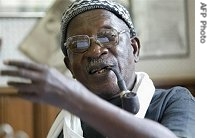2007年VOA标准英语-Senegal Prepares Ousmane Sembene Tribute
搜索关注在线英语听力室公众号:tingroom,领取免费英语资料大礼包。
(单词翻译)
By Phuong Tran
Dakar, Senegal
13 August 2007
Ousmane Sembene, the Senegalese film director and novelist who died this past June at age 84, is widely known as the father of African cinema. But before he was recognized for films that protested colonization1, sexism and social injustice2, he was a manual laborer3. Sembene went on to make films about the struggles of the working poor. Since he passed away in June after a long illness, Sembene has been remembered in ceremonies around the world, but not yet in his home country. Senegalese President Abdoulaye Wade4 has asked cultural leaders to plan an homage5. Phuong Tran has more from Dakar.
 |
| Ousmane Sembene (2005 file) |
Clarence Delgado worked with him for 25 years at Sembene's production company, Filmi Doomireew. He says the artist suffered in silence for seven months. "We protected his secret until the end. I wanted people to have a memory of how radiant he was, not how frail6 he became."
Sembene's office is filled with reminders7 of the more than one dozen films he produced, his novels, and numerous film festival awards.
"Sembene's experience with women, with colonization, with history-every film he made included a different part of his personal experience and philosophy," said Delgado.
In 1989, Sembene made the movie "Camp Thiaroye" about a French massacre8 of African soldiers who revolted to demand severance9 pay.
Delgado remembers the film as the most intense and emotional one he made with Sembene. "One day on the set, Sembene just screamed in anger and left. I followed him home. He told me that we had to finish the film as soon as possible. Then, we both cried. We just cried. It was all too much."
Sembene achieved many cinematic milestones10 during his career. In 1968, Sembene distributed his first film in color, "Le Mandat". It was also the first time a major film was made in Wolof, a widely spoken language in Senegal. The story followed the impact of colonialism on two different people.
Senegalese film critic Baba Diop has followed Sembene's career for more than two decades. He says "Le Mandat" proved it was possible to make a film in a local language. "All the films up to that point were dubbed11 in French. The mentality12 was that a film had to be made in French. But Sembene was committed to promoting our national language."
"Sembene observed closely Senegalese society. His films have details,” Diop illustrated13, “like scenes from a barber shop, a shave, which is part of the common man's routine."
Cheikh Ba co-founded the Senegalese Filmmaker's Association with Sembene and is its current president. He says Sembene was like a vendor14 of used, forgotten and abused parts. "He collected these lost voices the way some gather stray artifacts, and brought them back to life. For the homage, we will bring together those voices-the different parts of Sembene."
Sembene once told art critic Diop that he distrusted fame and glory because they were short lived. Rather, Sembene said, he preferred to live forever and work among the people.
 收听单词发音
收听单词发音 




